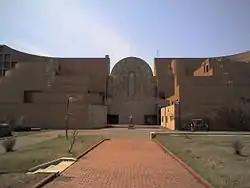Kushiro City Museum
Kushiro City Museum (釧路市立博物館, Kushiro Shiritsu Hakubutsukan) is a registered museum in Kushiro, Hokkaidō, Japan.[2] The Museum's predecessor institution, the Kushiro City Folk Museum (釧路市立郷土博物館), began as an exhibition room at the offices of the local water board in 1936, before moving to a department store, then from 1949 to the relocated former Kushiro City Police Station.[1] Upon completion of the new, dedicated museum building in 1983, the museum was renamed the Kushiro City Museum.[1] The displays centre around the geology, flora and fauna, and history of the area, with exhibits including the fossil jaw from which the Kushiro tapir [ja] (Plesiocolopirus kushiroensis) was described as well as Jōmon, Satsumon, and Ainu materials.[3][4]
| Kushiro City Museum | |
|---|---|
釧路市立博物館 | |
 | |
| General information | |
| Address | 1-7 Shunkodai |
| Town or city | Kushiro, Hokkaidō |
| Country | Japan |
| Coordinates | 42°58′29″N 144°24′13″E |
| Opened | 3 November 1983[1] |
| Design and construction | |
| Architect(s) | Mozuna Kikō[1] |
| Website | |
| Official website | |
References
- 博物館の生い立ち~since 1936~ [Growth of the Museum — from 1936] (in Japanese). Kushiro City Museum. Retrieved 9 June 2022.
- 道内の登録博物館・博物館相当施設 [Registered Museums and Museum-equivalent Facilities in Hokkdaidō] (PDF) (in Japanese). Government of Hokkaidō. 1 November 2019. Retrieved 9 June 2022.
- "Main Exhibition Guide". Kushiro City Museum. Retrieved 9 June 2022.
- 北海道内のアイヌ文化に触れられる施設 [Facilities in Hokkaidō where one can engage with Ainu Culture] (in Japanese). National Ainu Museum and Park. Retrieved 9 June 2022.
This article is issued from Wikipedia. The text is licensed under Creative Commons - Attribution - Sharealike. Additional terms may apply for the media files.